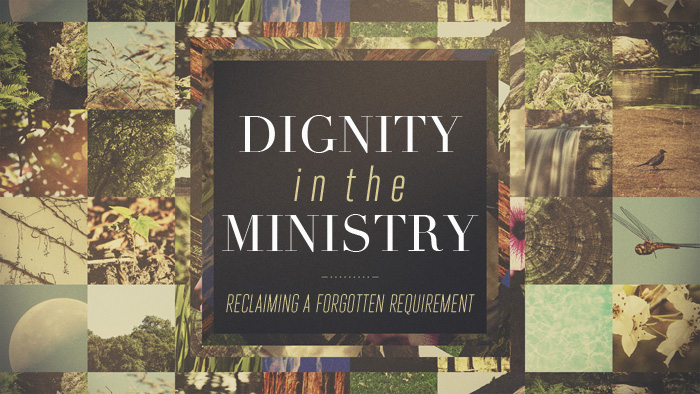There is a prominent little word in the pastorals that gets little attention in modern discussion on ministry: dignity. In fact, the great apostle tells us that “dignity” ought to be not only the aim of every church officer, but every Christian as well.
THE UBIQUITY OF DIGNITY
To see the pervasiveness of dignity we need only look to how its commending and commanding in 1 Timothy:
- Christians everywhere are commanded to pray for governing authorities so they may live a life of dignity that stretches into every sphere (1 Tim. 2:2).
- Distinguishable dignity must characterize an elder’s life and ministry (1 Tim. 3:4-5).
- Ditto for deacons; they gotta be dignified too (1 Tim. 3:8).
- Dignity is as valuable a jewel for women as it is for men (1 Tim. 3:11).
THE GRAVITY OF DIGNITY
So, dignity is necessary, but what is it exactly? I suspect it’s a word most people would be able to spot, but few would be able to define. The Greek word Paul uses is σεμνότης (semnotes) and is synonymous with honor, gravity, or seriousness.1 Here then is my working definition of dignity:
Christian dignity is the moral and spiritual gravity attending reverent godliness.
If we understand the inherent seriousness of dignity we can understand why it’s a characteristic going the way of the dodo. We live in an evangelical climate that all too often completely reflects our broader culture, a culture that heralds youthfulness on an unprecedented scale. Look no further than recent the recent radio smash “We Are Young” where a man in his fourth decade of life celebrates youth that “sets the world on fire.” (If you need convincing of how much the secular youth culture drives contemporary evangelicalism check out Stephen Nichols incisive article on “Youth-Driven Culture.”)
Dignity has never been, nor will ever be, a flag waved on high by youth. Thus, whenever and wherever the church caves into culture’s celebration of youth we can expect dignity to gather dust in the corporate attic. It seems, to me at least, that it’s high time to dust off this glorious jewel and reclaim it as a requirement for pastoral ministry. For if we want our churches to be a dignified witness, and we should, we must begin with pastors dripping in dignity.
THE MINISTRY OF DIGNITY
This reclamation project must begin with a reorientation of our hearts and minds to the biblical reality that pastoral ministry is necessarily a dignified ministry. And a dignified ministry requires dignified men. Christ has entrusted His ministers with His mission and His means of grace. Dignity courses through our calling like blood flows through our veins. His mission is grave – life and death hang in the balance – so there must be a sense of gravity when we storm the mercy seat and ascend to the sacred desk. His meal of grace is one we offer in reverent faith lest we eat and drink God’s judgment.
Each week the pastor lifts up the Kings of Kings whose kingdom is not of this world so we dare not hold Him with common casualness. Charles Bridges is right to say, “The moment we permit ourselves to think lightly of the Christian Ministry, our right arm is withered; nothing but imbecility and relaxation remains.” He later says, “Dignity of character will thus correspond with dignity of station.” What then might a dignified character look like?
Consider this portrait of the late and great Samuel Miller of Princeton,
He seldom entered a house, or engaged in conversation, without dropping a word at least to comment the Savior. His sermons . . . were full of weighty gospel truth, and were delivered with great animation and unction. . . . His fidelity to souls; his watchfulness for opportunities of doing good; his practical wisdom; his prudent management of all his private affairs; his tender dealing with prejudice and passion; his guardedness against giving offense; his remarkable freedom from envy and jealousy; his large, disinterested benevolence; his liberality and unworldliness; the dignity of his manners . . . always commanding respect; his habitual cheerfulness; his whole consistent life and ministry, ‘forever the same’, were constantly conspicuous and most influential for good.2
That sure seems to be a life of moral and spiritual gravity attending reverent godliness. May God help us to cherish and aim for such dignity in the ministry.
—————————————————————————————————————
- See George Knight, in his “must be reckoned with” commentary on 1 Timothy, p. 161-162. ↩
- The Life of Samuel Miller, 84. ↩


